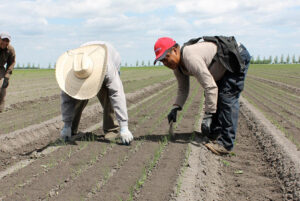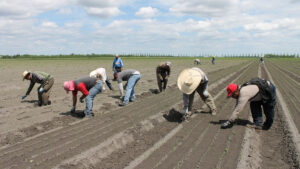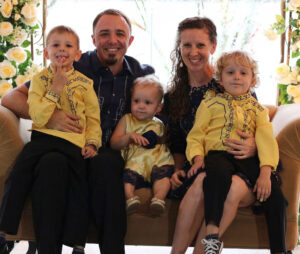Growing up as a member of the Sumacher Indigenous peoples group in the Philippines, Tala Bautista listened to American music. She longed to see snow and perhaps roast chestnuts on an open fire. She wanted to see the West Virginia country roads of which John Denver sang.
American cultural influence is pervasive in the Philippines, partly because it was a United States territory from 1898 to 1946.
Eventually, Bautista went to the United States to complete a master’s degree at the Center for Justice and Peacebuilding at Eastern Mennonite University (EMU). There, she understood the draw of the Blue Ridge Mountains and Shenandoah River that Denver sang about.
Today, back in the Mindanao region of the Philippines, Bautista is a leader at Peacebuilders Community Inc. (PBCI) and Coffee for Peace (CFP). These organizations were founded by Dann (also known by his Indigenous name, Lakan) and Joji Pantoja in the mid 2000s.
Bautista treasures her Indigenous heritage and grieves the harm done by well-intentioned but misguided missionaries. She remembers missionaries who came to the Philippines speaking disparagingly of Indigenous culture, calling traditional music demonic.
During the month of October, Bautista, Joji Pantoja and Ka Boyet Ongkiko, also of PBCI, travelled to several locations in Canada, including Niagara-on-the-Lake, Kitchener-Waterloo, Leamington, Winnipeg and Vancouver, to share about their work.
While in Leamington, the group made stops at UMEI Christian High School and Uni-Fab metal fabricators. They also visited the Gleaners project, where they saw how dried vegetable mixes are packaged, and Seacliff Energy, to learn about ways to deal with food waste. The Barkovsky family’s organic farm was also on the itinerary.
In the Philippines, colonization and the strong influence of multinational corporations have resulted in unjust societal structures and tension between groups. When the Pantojas returned to the Philippines after 20 years in Canada, they saw how economic inequities cause conflict. They learned the Mennonite tradition of peaceful engagement through organizations such as Mennonite Central Committee (MCC) and used the teachings of Mennonite scholars such as John Paul Lederach to promote peace in the Philippines. This connection with the Mennonites has resulted in long-term support from MCC.
What began as conflict resolution over cups of coffee became a way for economically disadvantaged farmers to support themselves and their families by cultivating coffee, which CFP sells at fair prices in the Philippines and beyond. For PBCI and CFP, the process of nurturing coffee farmers and nurturing peace cannot be separated. The organization has worked throughout the Philippines to teach harmony with the Creator, others and creation.
Ka Boyet Ongkiko, who has served on the board of PBCI and is now tasked with organizing community members, has an infectious passion for his work. “Wherever we are,” he says, “we share the same heart; [we’re] created in God’s image, with inherent value and dignity as human beings. Our lives are joined together and we share each other’s joy as well as each other’s pain.”
The work is paying off. Today, multi-national corporations doing business on Indigenous land work with the tribes and share profits, to the benefit of all. One corporate CEO was so interested in the principles of peace that a 15-minute meeting with PBCI stretched to hours. He had his administrators trained to facilitate positive relationships with the Indigenous community.
Today, the corporation says peace and cooperation with Indigenous tribes is one of its central values.
Peacebuilders Community Inc. has received several awards from the United Nations, as well the Oslo Business for Peace award. Despite all of this, Joji never loses her focus on the micro level and says that change happens “one farmer at a time.” Coffee is a means of empowering individuals, families and communities to bring about peace and harmony.
As Bautista, Joji and Boyet gathered in homes of the Mennonite community in Leamington this past month, a sense of joy was evident in the laughter, stories and shared values.
The Leamington portion of the trip was organized by Lois and Edna Konrad, sisters-in-law who went on a learning tour to the Philippines in January 2023. The tour was led by Norm Dyck of Mennonite Church Eastern Canada.
On Sunday, at Leamington United Mennonite Church, Bautista shared her experience growing up Indigenous, and the strong sense of exclusion she felt, even from God’s story. Later, she realized that her Indigenous core values of harmony with the Creator, self, others and creation were central to the biblical story as well.
Matt Tiessen shared about his life-changing time serving as an intern in the Philippines, working with the Pantojas. Afterward, over cups of coffee produced by CFP farmers, church members listened as Joji shared that her greatest joy is seeing farmers enjoying a peaceful life and having dignity and pride.
As the Pantojas begin the process of retirement, Bautista, Boyet and other leaders will continue the work of peace-building that has already borne fruit. The focus will continue to be on coffee production.
Back home in the Philippines, Dann is overseeing an exciting new project—the construction of the Malipayon Peace Hub, which will provide a peace and reconciliation training centre for PBCI, an upgraded processing and farmer training centre for CFP, a new staff house and guest house, and a delivery vehicle. Over the past five years, PBCI has received 25-35 percent of its budget from Mennonite Church Canada, but this funding is expected to be replaced by the increased capacity and profits from the new and upgraded post-harvest processing operations.
MC Canada welcomes donations toward construction of the Malipayon Peace Hub. It has received donations of $83,000 toward the goal of raising $235,000 by March 2024.
If you ask Bautista what she dreams of these days, she speaks with anticipation of finding more microroasters in Canada so that an entire 33-tonne shipping container of coffee can be sent to Canada, opening up a whole new market for peaceful coffee.
Valerie Kauffman attends Leamington Mennonite Church.









Leave a Reply
You must be logged in to post a comment.